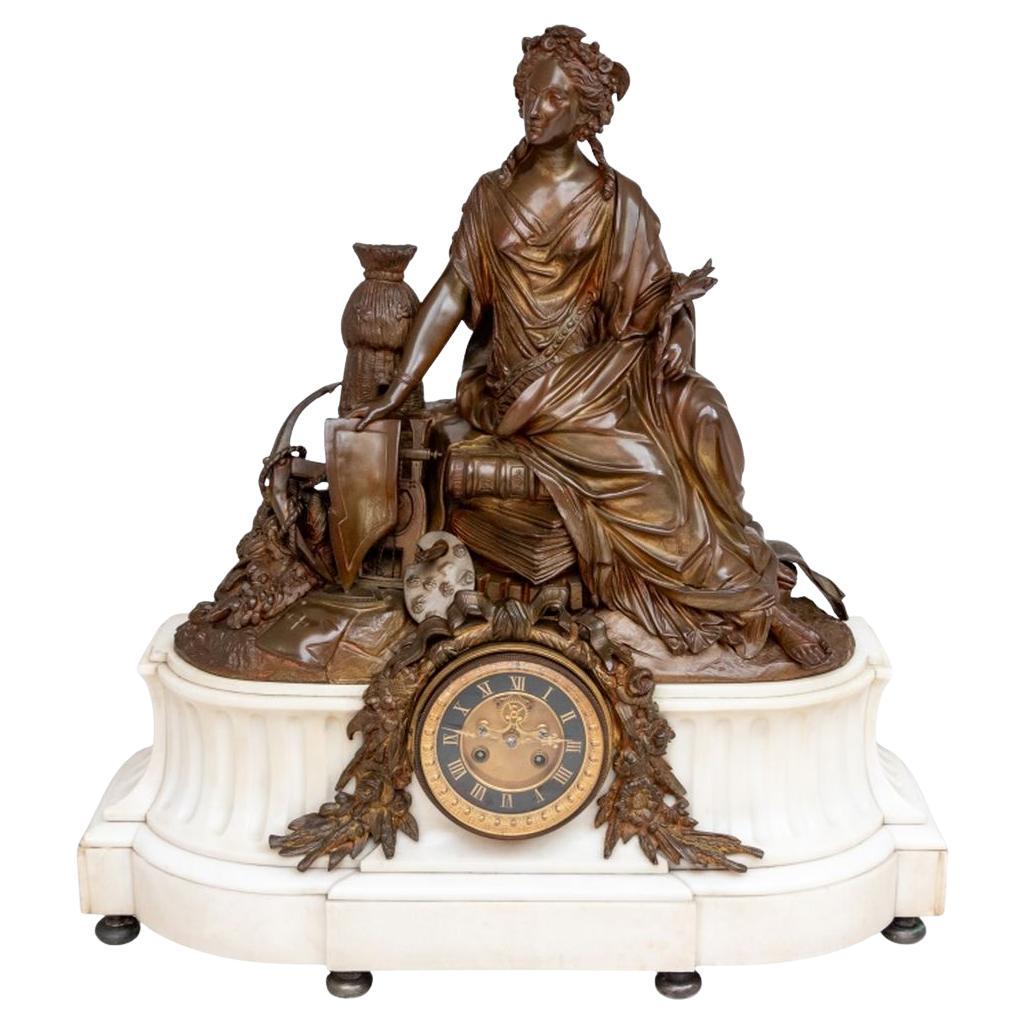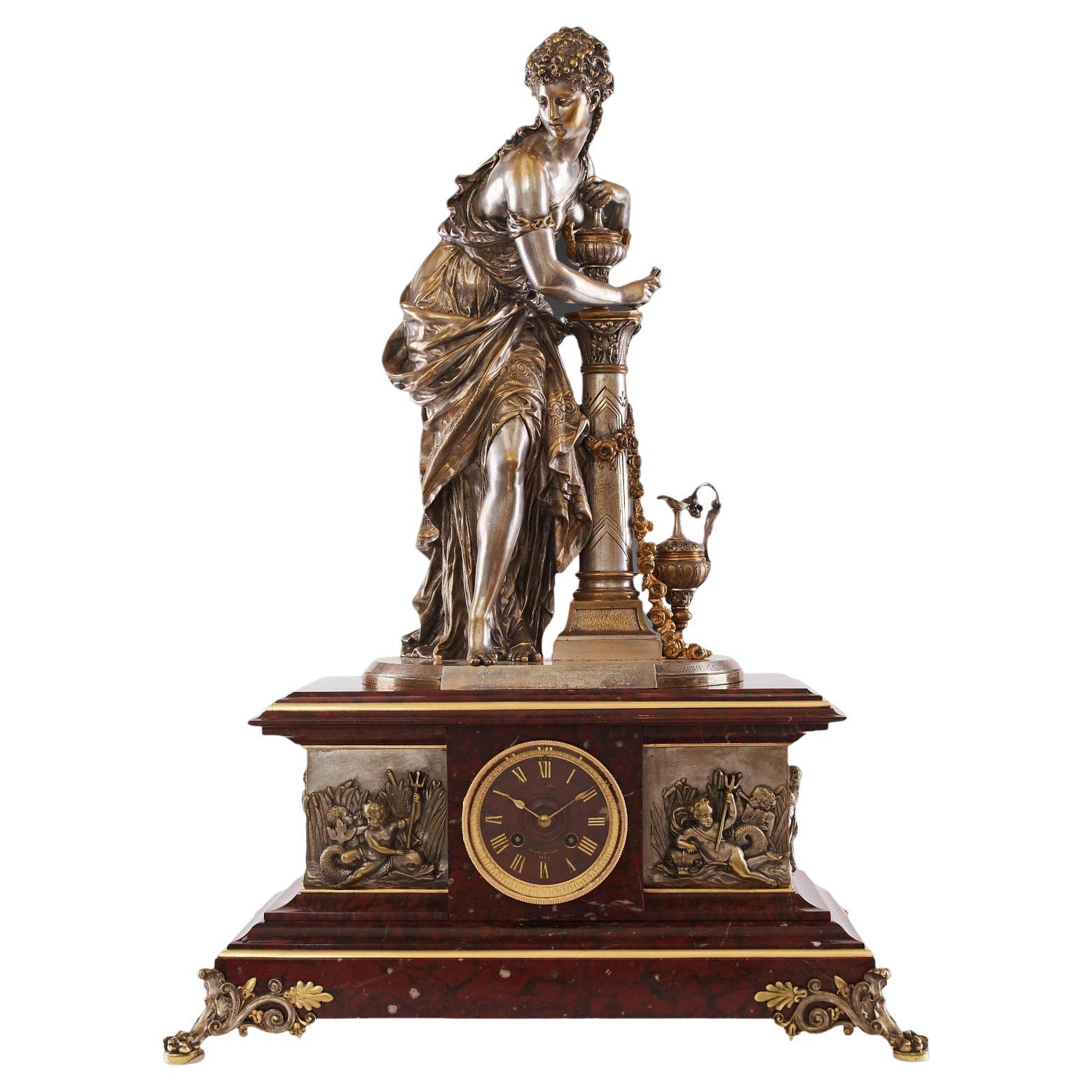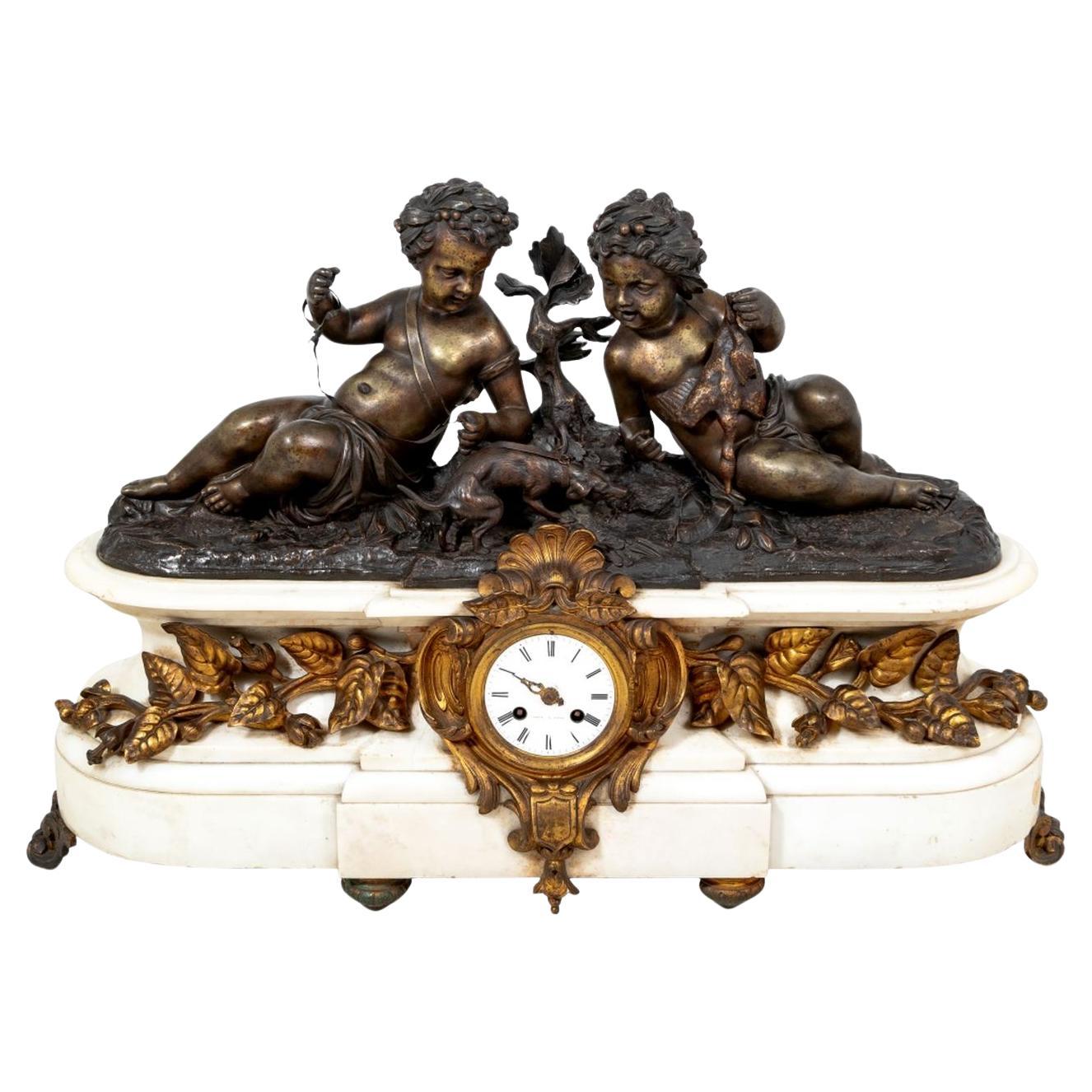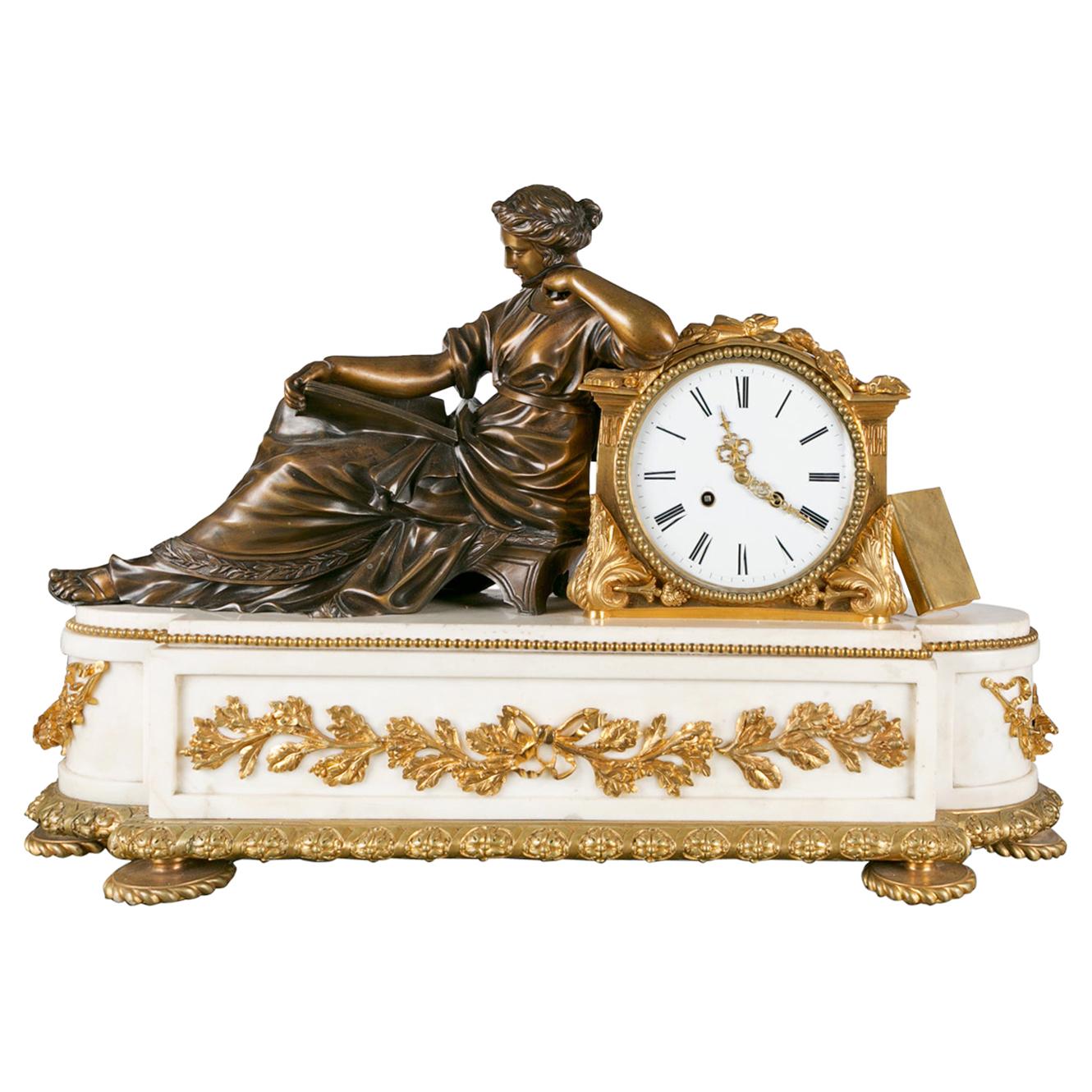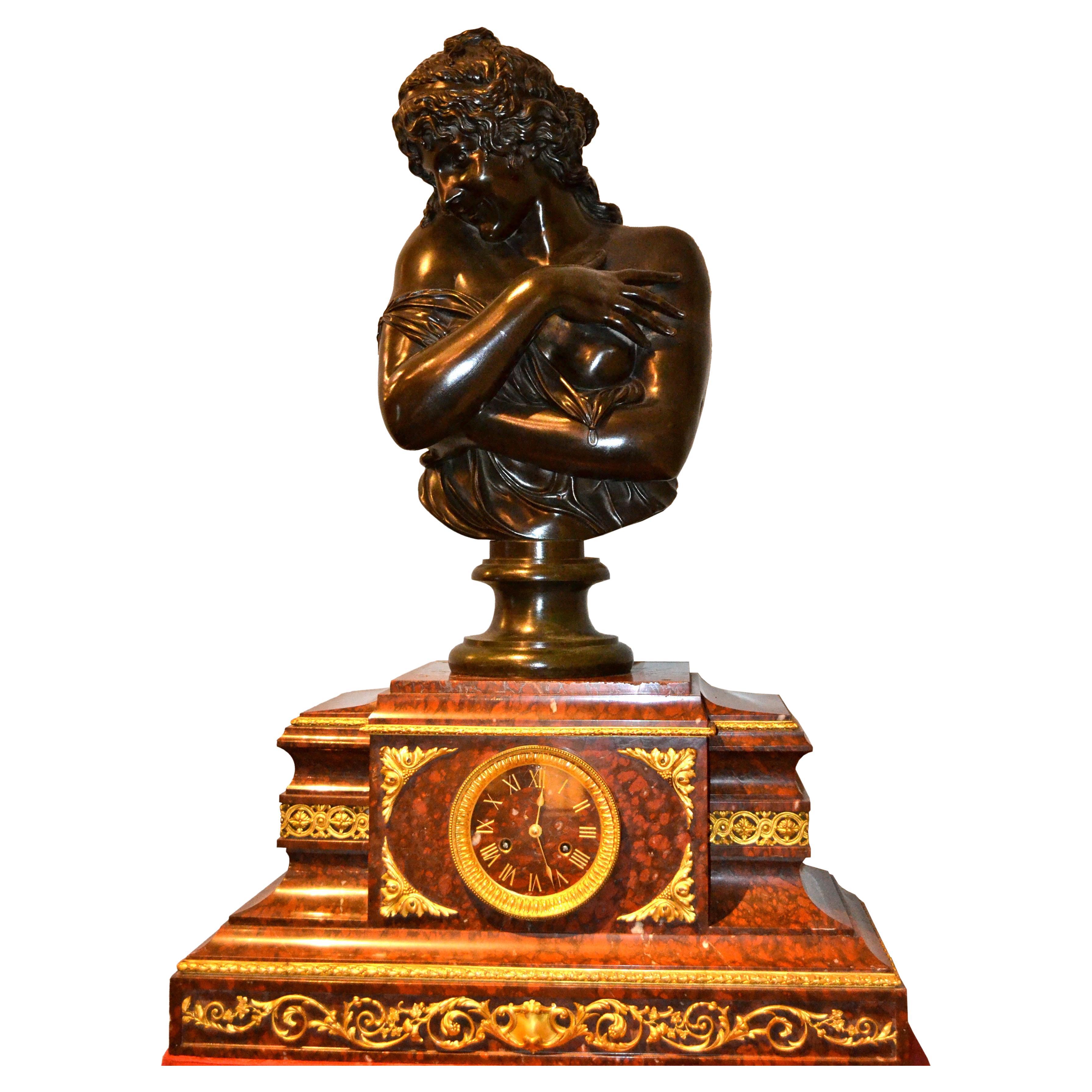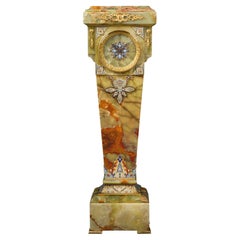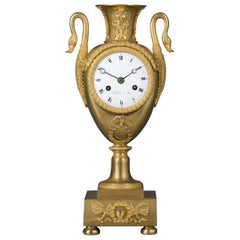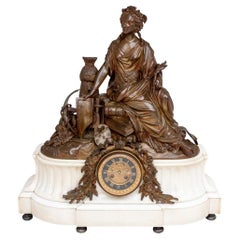Items Similar to A Napoléon III Marble Mantle Clock
Want more images or videos?
Request additional images or videos from the seller
1 of 8
A Napoléon III Marble Mantle Clock
$9,613.62
£7,200
€8,331.54
CA$13,546.02
A$14,915.47
CHF 7,734.32
MX$176,640.15
NOK 98,182.27
SEK 91,762.46
DKK 62,226.74
About the Item
A Napoléon III Marble Mantle Clock With A Patinated Bronze Figure of 'Phryné' by James Pradier. France, Circa 1860.
Surmounted by a finely cast patinated bronze figure of the Grecian courtesan, 'Phryne', cast from the model by Jean Jacques (called James) Pradier (1790-1852). Atop a rouge griotte marble entablature with fluted sides and stepped base fronted by a clock dial with Roman numeral chapters, the twin-barrel movement with strike on bell.
Signed 'Pradier'
French, circa 1860.
Phryné was companion of the Greek sculptor Praxiteles, and had been accused of ungodliness. Facing certain conviction, at a loss for what to do, her lawyer asked her to remove her clothes to show her innocence, and this immediately convinced the judges of her purity and she was acquitted. It is likely that Pradier's inspiration was the beautiful actress Juliette Drouet (1806-830, by whom he had had a daughter some years before.
Pradier's statue of Phryné was originally made from Parian marble, an entirely appropriate medium in view of the very Grecian subject of the work. The marble of Phryné stood to a height of almost two meters with her jewels and drapery highlighted in polychrome and gold, she made a dazzling impression at the Salon of 1845. In 1851, Pradier exhibited her at the Great Exhibition in London and his was the only work by a French sculptor to be awarded a council medal.
Pradier licensed production of bronze reductions of his statues to the foundeur Susse Frères. Who in turn agreed to cast an edition to a high standard. Several contracts exist between Pradier and Susse dated between 1841 and the sculptor's death in 1852, and thereafter giving Susse full ownership to continue editing his work. Susse Frères sales catalogue of 1860 lists the bronze statuette of 'Phryné' at 40 cm. high, like the present example, retailing at 150 Ffr.
Comparative Literature:
C. Lapaire, James Pradier (1790-1852) et la sculpture française de la génération romantique, Catalogue Raisonné, Lausanne, 2010, cat. 232, pp. 331-333.
- Creator:J. Pradier (Sculptor)
- Dimensions:Height: 25.6 in (65 cm)Width: 13 in (33 cm)Depth: 7.49 in (19 cm)
- Style:Napoleon III (Of the Period)
- Materials and Techniques:
- Place of Origin:
- Period:
- Date of Manufacture:Circa 1860
- Condition:Wear consistent with age and use.
- Seller Location:Brighton, GB
- Reference Number:Seller: B763901stDibs: LU1028031755582
About the Seller
5.0
Recognized Seller
These prestigious sellers are industry leaders and represent the highest echelon for item quality and design.
Established in 1964
1stDibs seller since 2014
59 sales on 1stDibs
Typical response time: 1 hour
Associations
The British Antique Dealers' AssociationLAPADA - The Association of Arts & Antiques Dealers
- ShippingRetrieving quote...Shipping from: Brighton, United Kingdom
- Return Policy
More From This Seller
View AllA Napoleon III Onyx and Champlevé Enamel Pedestal Clock
Located in Brighton, West Sussex
A Napoleon III Gilt-Bronze Mounted Onyx and Champlevé Enamel Pedestal Clock.
The movement with a twin-barrelled eight-day anchor escapement with Brocot-type regulation striking on ...
Category
Antique 19th Century French Napoleon III Grandfather Clocks and Longcase...
Materials
Onyx, Bronze, Enamel
Louis XVI Style Gilt Bronze and White Marble Clock By François Linke, circa 1890
By François Linke
Located in Brighton, West Sussex
A fine Louis XVI style gilt bronze and white marble clock depicting Diana and Cupid, by François Linke.
French, circa 1890.
Signe...
Category
Antique Late 19th Century French Louis XVI Mantel Clocks
Materials
Marble, Bronze
Empire Clock in the Form of a Classical Urn, by Maison Lepautre, circa 1825
By Pierre-Basile Lepaute
Located in Brighton, West Sussex
A gilt bronze Empire clock in the form of a classical urn, by Maison Lepautre.
French, circa 1825.
The dial signed 'Lepaute a Paris'.
The clock has an ornate cast bezel with a 3-inch porcelain dial with Roman numerals and Breguet style hands. The twin train eight-day movement with outside count wheel striking on a bell and silk thread suspension.
This elegant Empire style clock has a gilt bronze case in the form of a classical urn with swan neck handles and a winged cherub to the neck. The circular pedestal base is raised on a footed stepped square plinth.
The Lepaute family were the premier French clockmakers of their day. Their significance lies in their contribution to the clock making industry which had hitherto come under the trade of locksmiths. The family held the brevet Horlogers du Roi.
Jean-André Lepaute (1720–1789) arrived in Paris at an early age and in 1740 founded the family business. A skilled artist and mechanic, he quickly gained an excellent reputation. He was received as maître by the clockmakers guild in 1759, was granted royal lodgings from the king in The Luxembourg Palace, and was entrusted with the construction of the majority of the great public clocks of Paris. He executed, amongst others, those in The Luxembourg Palace, the Jardin des Plantes, the Château de Bellevue and the Château des Ternes. His clock at Paris’s École Militaire still works today. Three editions of his Traité d’Horlogerie were published in Paris in 1755, 1760 and 1767. A small volume, Description de Plusieurs Ouvrages d’Horlogerie appeared in 1764. Jean-André’s wife, Nicole-Reine Etable de la Brière (1723-1788), was a highly esteemed mathematician and astronomer. Her passion for science lent itself to Lepaute’s work and she played an active role in the scientific and mathematical aspects of the clock making.
Jean-André’s younger brother Jean-Baptiste Lepaute (1727-1802) joined him in Paris in 1747 and immediately started working for the family business. He was received as maître in 1776 and was known for the clocks he constructed for the Paris Hôtel de Ville (1780), destroyed in a fire of 1871, and for the Hôtel des Invalides (1784). Jean-Baptiste took over the workshop when Jean-André retired in 1775.
After Jean-Baptiste’s death in 1802, the firm was taken over by his nephew Pierre-Basil Lepaute (1750-1843) where he was duly joined by his own nephew Jean-Joseph (1768-1846) and son Pierre-Michel (1785-1849). By 1816, Pierre-Michel Lepaute was in charge of the business. His masterpieces include the astronomical clock in Paris’s Bureau...
Category
Antique Early 19th Century French Empire Mantel Clocks
Materials
Bronze
Fine Louis XVI Style Gilt and Patinated Bronze Figural Clock, circa 1870
Located in Brighton, West Sussex
A fine Louis XVI style gilt and patinated bronze figural clock.
French, circa 1870.
This fine clock has a waisted body decorated with scrolls and trellis centred by a white ena...
Category
Antique Late 19th Century French Louis XVI Mantel Clocks
Materials
Bronze
A Napoléon III Silvered-Bronze Clock Garniture by Charpentier, Paris
By Charpentier et Cie
Located in Brighton, West Sussex
A Large and Important Napoléon III Gilt and Silvered-Bronze Sculptural Three-Piece Clock Garniture, By Charpentier, Paris.
Comprising a mantle clock and a pair of figural vases. The...
Category
Antique 19th Century French Napoleon III Mantel Clocks
Materials
Bronze
Napoléon III Gilt-Bronze Double-Faced Clock. French, c 1870
By Julien Le Roy
Located in Brighton, West Sussex
A rare Napoléon III gilt bronze double-faced clock.
The white enameled dial signed 'Julien Le Roy A PARIS'.
This rare Rococo style figural clock h...
Category
Antique Late 19th Century French Napoleon III Table Clocks and Desk Clocks
Materials
Bronze
You May Also Like
Napoleon III Bronze & Marble Figural Clock, 1870
Located in Astoria, NY
Napoleon III Patinated Bronze and White Marble Figural Clock, circa 1870, the seated figure illustrative of the Arts, surmounting a fluted breakfront white marble base, centered by a...
Category
Antique 1870s French Napoleon III Mantel Clocks
Materials
Marble, Bronze
Napoleon III Mantel Clock with Red Marble, 19th Century
Located in Lisbon, PT
A Napoleon III mantel clock featuring a dynamic sculpture of a Revolutionary French peasant woman.
Made from high-quality metal and adorned with rich red marble accents, this timep...
Category
Antique 19th Century French Napoleon III Mantel Clocks
Materials
Marble, Metal
$2,750 Sale Price
20% Off
Mantel Clock 19th Century Napoleon III Period by Moreau Mathu
By Mathurin Moreau
Located in Warsaw, PL
An exceptional example of 19th-century French craftsmanship, this mantel clock by the renowned sculptor Moreau Mathu embodies the opulence and refinement ...
Category
Antique Mid-19th Century French Napoleon III Mantel Clocks
Materials
Silver, Bronze
$5,508 Sale Price
28% Off
Napoleon III Patinated Bronze & Marble Clock
By Napoléon III
Located in Astoria, NY
Napoleon III Gilt and Patinated Bronze and White Marble Clock, circa 1870, of rounded rectangular form, the circular white enamel dial signed "Gros A Lyon", the movement strike on be...
Category
Antique Late 19th Century French Napoleon III Mantel Clocks
Materials
Marble, Bronze
19th Century Neoclassical Marble and Gilt Bronze Figural Mantle Clock
Located in Dublin 8, IE
A fine 19th century neoclassical statuary white marble and gilt bronze figural mantle clock, the finely cast patinated classical female in seated pose juxtaposed to gilded bronze clo...
Category
Antique 19th Century French Napoleon III Mantel Clocks
Materials
Marble
Griotte Marble and Gilt Bronze Clock Mounted by a Classical Female Bronze Bust
Located in Vancouver, British Columbia
A finely cast gilt bronze clock base mounted with of a classical patinated bronze bust of a maiden after a model by James Pradier. The maiden has her curly haired head turned demurely to one side resting on her bare shoulders, and hands clasped across her partly exposed breasts...
Category
Antique Late 19th Century French Napoleon III Mantel Clocks
Materials
Griotte Marble, Bronze
More Ways To Browse
Napoleon Iii Marble
Griotte Rouge Marble
French Bell
Antique Parian
1860 French Circa Mantel Clock
Antique French Bell
Marble And Bronze Mantle Clock
Napoleon Marble Clock
Mantle Clock Bronze Marble
Bronze James Pradier
Jean James Pradier
19th Century French Black Marble Mantel Clock
Boulle Tortoise Shell
Ormolu And Sevres Clock
Standing Clock
White Marble Mantel Clock
19th Century French Bronze Dore Clock
1860 French Circa Mantel Clock
